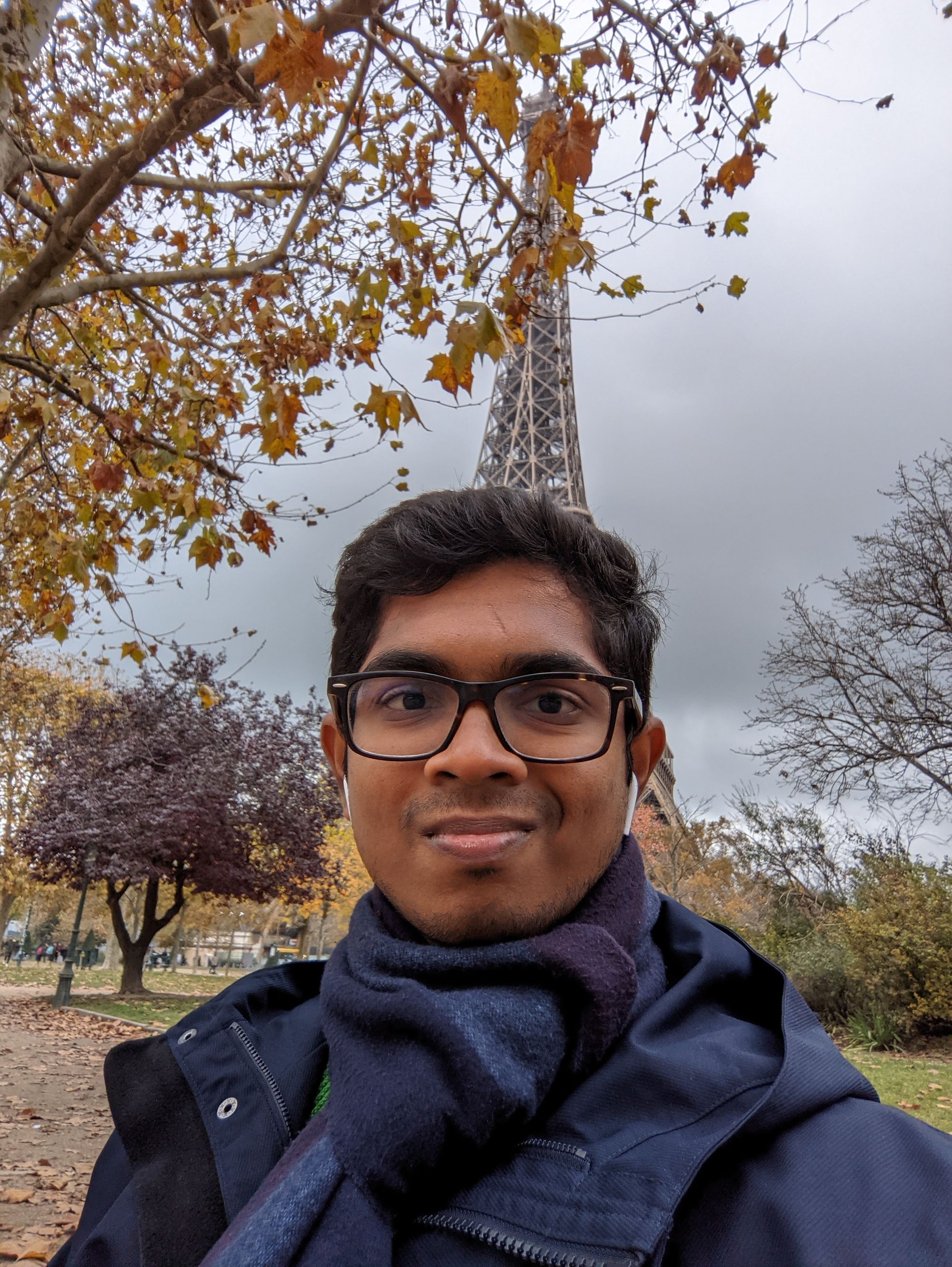Testing the waters of research
Rathin Jeyaram is a recent alumnus of PSG Tech (M.Sc Theoretical Computer Science, 2015-20) who has had multiple stints overseas as an intern in Singapore, Canada, and France over a 2 year period. He is now a Ph.D student at the Learning Planet Institute associated with Université Paris Cité in Paris, France. Having seen the world from various perspectives, he sheds light on the nitty-gritties of a career in research during his conversation with our correspondents. Here is an excerpt from our interview with him:

Krishna: Tell us about your experience in France and the troubles you faced with regards to language and otherwise when you first went to Paris.
Rathin: I first arrived here in December 2019 as an intern and the university that my lab was associated with at the time was in the process of a merger with another university. So, about a month into my internship, the university that appeared on my internship agreement did not exist. Because of this, I wasn’t paid any stipend for nearly 4 months. By the time I received my stipend, it was the first week of lockdown due to the corona virus and I couldn’t explore the city, let alone use French anywhere. Of course, much like the rest of the world, we were working from home but the environment in the lab was interdisciplinary and international. Naturally, English was the working language and so, I did not face too many issues initially. It was only later when my internship visa expired that I started having some issues with the language in trying to find a way to extend my visa and regularize the paperwork.
Krishna: You’ve been in France for about 2 years now. Tell us about any differences that you may have observed between the two countries.
Rathin: I’ve had a varied research experience even within France and I have been able to talk to a lot of researchers here. The lab that I work with, the Learning Planet Institute (previously the Centre for Research and Interdisciplinarity) is unlike other research institutions, in that they hire researchers for 3 or 5 years and they do not have any teaching duties as professors. They are simply young researchers with an idea in mind and a proposal at hand, who are provided with the funding and the resources to realize their project. In this timeframe, they hire graduate students as interns, either locally or from elsewhere in the world, who are working in similar areas. I happened to be one such intern who arrived here from India and I work with a team focused on Network Science. Overall, you don’t have such a concept as tenure here; everyone is a researcher and there is no hierarchy as such, allowing us to interact freely with everyone else as opposed to say, experienced faculty members and so on. There are 3 departments within the lab, one in Interdisciplinary Biological Sciences, another in Digital Sciences, where I work within the Network Science group, and a unique other department of Learning Sciences which aims to provide innovative learning solutions and encourage learning in different settings.
The overall setting is very dynamic. For instance, you have biologists who work on developing games for people to understand immune responses better and as you interact with these people, you realize the fact that ideas that seem trivial in nature have so much potential to them. It isn’t all about equations, experiments and all the complex stuff that is associated with research. There is also the interdisciplinary nature and an outreach aspect to it, something that I was introduced to only after I came here.
Krishna: This isn’t your first research experience though. You’ve previously worked at NUS in Singapore and also as a MITACS Globalink Research Intern at the University of Toronto-Scarborough. Could you tell us about your experiences there?
Rathin: Well, even before those experiences, the time I spent taking a course on graph theory, taught by Lekshmi ma’am in our department was the motivating factor for me to take up research. I was genuinely interested in the problems associated with the subject and was working in that area for a while. Naturally, as we approached our 7th semester internships, I intended to take up something close to graphs, but also look at it from the perspective of applying it to some other areas and eventually analyse some data with the help of graph theory. That is when the opportunity to work on evolutionary networks rolled in from NUS. But as it turned out, we ended up working on graph theoretical models rather than analysing data. Even though it was intellectually rewarding given that I worked with some of the smartest minds in the subject, I realized that this was not what I was looking for. Eventually, I ended up in Canada and worked on data analysis surrounding protein sequences, reconstructed networks and so on, which was closer to what I wanted to do.
This still wasn’t me picking what I wanted to do though; I was simply given these opportunities and I took them. I gained a lot of experience but in the end, I was a student of Computer Science who did not have the expertise in a subject like Biology to take that further. Social Network Analysis was even closer to where I wanted to be (I'd taken the elective as a part of my coursework) and when I landed an opportunity to work in the lab that I do today, I realized that this is where I really fit in.
Krishna: If there is a gap that you would want to bridge between the systems in these different environments of learning, what would you suggest?
Rathin: A great aspect of our programme in Theoretical Computer Science is that we learn the fundamentals of several complex tools like linear algebra, probability and statistics for Machine Learning, proofs, proof techniques and algorithms in graph theory, and so on. We are exposed to the sheer depth of the subjects and I sometimes feel that there could be an emphasis on the breadth of it as well, to understand the applications. I personally feel that until I came here, my thought processes were too narrow.
For instance, what if we were allowed to explore and take a course, an elective from a department completely unrelated to our own? Maybe an elective from the biotechnology department. It allows students to venture into new areas and the overall nature of cross-disciplinarity is sure to open up a lot of doors.
Krishna: Did you look at the prospect of research and think “maybe not” at any point?
Rathin: Yes! When I was in Singapore, I was actively applying for jobs back here in several companies and had even attended interviews, despite the fact that I was in a very intellectually stimulating environment. However, every time I looked at a job description for a role in a company, I seemed to think that it wasn’t my calling. This cycle went on for a while and I was also feeling increasingly isolated in a team that only consisted of my advisor, one of his Ph.D advisees who had already passed out by then, and myself. Besides, nobody in our office spoke any amount of English, so there was no real potential for communication either. In reality, it was only towards the fag end of my internship when I was working on my report that in an attempt to fill the pages, I started exploring and work actually started to become more interesting. In the end, despite the difficult environment, that was the time that I decided to eliminate the option of venturing into a company and move on with research as my core aim and also realized that my interests were less in theory and more in the applications of graphs.

Joel: When you talk about interdisciplinary work, do you have a particular preference for any one isolated discipline among them?
Rathin: In interdisciplinary research, you do not isolate any one discipline as such. Each of them has an influence on the other. For instance, in my work, there is an influence of all the three departments together. It is true that I have a lot of colleagues working in neuroscience for instance, but that still only puts me at the periphery of it and I don’t need to have a particular preference for one of them.
Joel: One of the main aspects of why I feel that a student of computer science wouldn’t want to take up research is its inherently theoretical nature and of course, most importantly, the pay. What are your thoughts on this?
Rathin: If you’re a research intern, then MITACS’ Globalink Research Internship programme is probably the gold standard in terms of the pay; it was even higher than the stipend that some Ph.D students received at the lab that I was working in at the time. I do agree though, that generally speaking, as an intern overseas, it is difficult and you will need some amount of external support from your family. However, as a Ph.D candidate, I think the pay is fairly sufficient and that you can sustain your hobbies, the occasional night-out, and even save some money. I personally don’t see an issue, but being in another country as an intern is certainly not as comfortable and doesn’t give you the same advantages as you may have working for a company back home as an intern.
Krishna: Shed some light on how the concept of a Ph.D is viewed in Europe.
Rathin: In Europe, if you’re a Ph.D candidate, you’re still considered a student even though it feels like you work at the university and are paid for it. I think this structure varies from country to country though. Besides, you even pay taxes on your salary but still have the benefits that any graduate level student does. In fact, you do everything else that someone working for an organization is doing while being a student in the eyes of the university, so you can project yourself as a researcher. At the end of the day, you’re paid for the work you do.
Krishna: As a concluding remark, what would you suggest to anyone with an eye on research coming out of PSG Tech?
Rathin: What helped me realize what I wanted to do was taking up internships. Nothing teaches you more than experience does. I would suggest that you dedicate one of your internship slots to give research a chance, especially if you’re undecided between research and working in a company. This is because a lot of people are already working for these companies and can help in gaining that exposure anyway, whereas research is personalized and every problem is different. If you have a topic that you’re interested in, the only way for you to realize if that is an avenue to pursue further is to do an internship in that area. There are several programmes that fund students to be research interns elsewhere over a summer break and these should be considered.
Team Bridge would like to thank Rathin for taking time off his schedule to talk to us for this interview.




